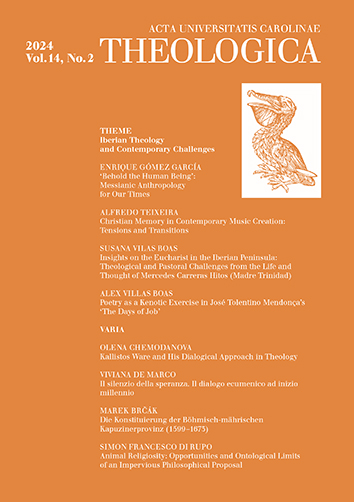AUC Theologica je recenzovaný odborný teologický časopis, který vychází dvakrát ročně. S výjimkou slavistických témat, recenzí a zpráv zveřejňuje příspěvky pouze ve světových jazycích – v angličtině, němčině, francouzštině a italštině.
Časopis se zaměřuje na širokou škálu teologických disciplín, jako je například systematická teologie, biblistika, patristika, pastorální a spirituální teologie, katechetika nebo církevní historie. V rámci nich se snaží reflektovat současná témata, která často vyžadují interdisciplinární přístup. Vítáme také teologické články, které se dotýkají jiných akademických oborů, jako je například filosofie, sociologie, literární věda či vědy přírodní.
Každé číslo se skládá ze dvou sekcí. Tematická sekce obsahuje články s jednotným zaměřením. V sekci s názvem „Varia“ publikujeme původní studie na různá aktuální teologická témata. Všechna čísla časopisu jsou dostupná v režimu Open Access.
AUC THEOLOGICA, Vol 10 No 2 (2020), 69–91
Frater cordis mei: Friendship in Augustine’s Confessions
Lenka Karfíková
DOI: https://doi.org/10.14712/23363398.2020.59
zveřejněno: 02. 02. 2021
Abstract
In Augustine’s Confessions, friendship not only has two forms, an individual and a communitarian one, but it also has two faces, a positive and a negative one. On the one hand, we find philosophical friendship which loves gratis (i.e. without thinking about any profit) and shares the common effort in search for wisdom. As Augustine puts it, such a friendship is based on a community of souls ascending to God. In his eyes, to love one’s friend ‘in God’ is even a necessary element of a true friendship. Besides an individual form of friendship, we also meet a broader community of friends in Augustine’s Confessions who even plan a common life devoted to philosophical leisure and later to religious service. On the other hand, both individual and communitarian forms of friendship also have their negative sides. Friendship is not necessarily a common search for wisdom, it can also become a substitute for such an effort. Even more harmful is the impact of what Augustine calls the ‘unfriendly friendship’ which makes ‘shame not to be shameless.’ We meet this behaviour in a group, even in a mob, several times in Confessions and find Augustine playing the role of both the seduced and the seducer.
klíčová slova: Augustine; Confessions; Friendship; Early Christian thinking

Frater cordis mei: Friendship in Augustine’s Confessions is licensed under a Creative Commons Attribution 4.0 International License.
148 x 210 mm
vychází: 2 x ročně
cena tištěného čísla: 100 Kč
ISSN: 1804-5588
E-ISSN: 2336-3398
